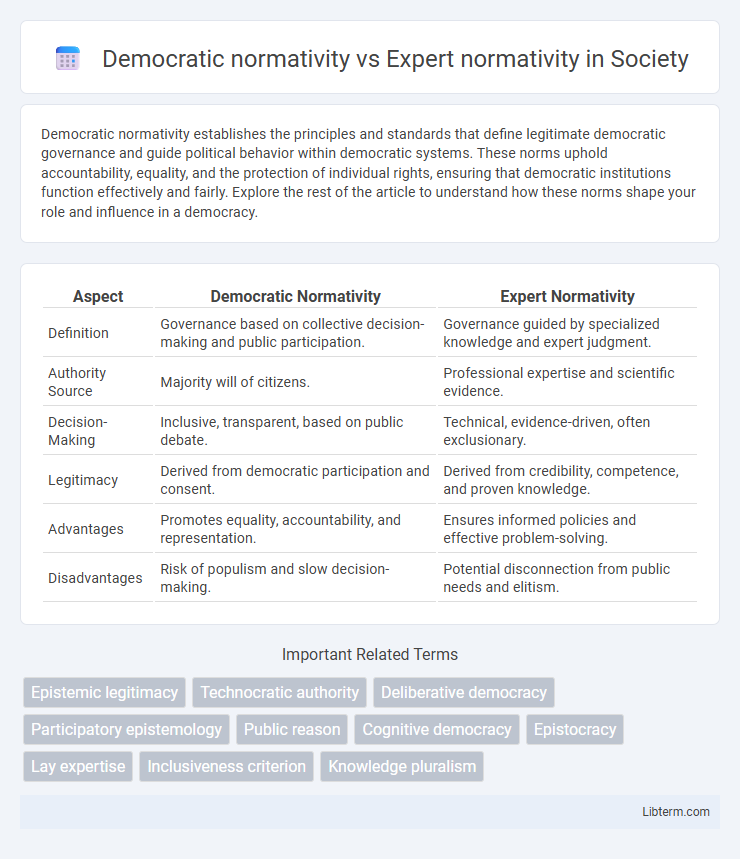Democratic normativity establishes the principles and standards that define legitimate democratic governance and guide political behavior within democratic systems. These norms uphold accountability, equality, and the protection of individual rights, ensuring that democratic institutions function effectively and fairly. Explore the rest of the article to understand how these norms shape your role and influence in a democracy.
Table of Comparison
| Aspect | Democratic Normativity | Expert Normativity |
|---|---|---|
| Definition | Governance based on collective decision-making and public participation. | Governance guided by specialized knowledge and expert judgment. |
| Authority Source | Majority will of citizens. | Professional expertise and scientific evidence. |
| Decision-Making | Inclusive, transparent, based on public debate. | Technical, evidence-driven, often exclusionary. |
| Legitimacy | Derived from democratic participation and consent. | Derived from credibility, competence, and proven knowledge. |
| Advantages | Promotes equality, accountability, and representation. | Ensures informed policies and effective problem-solving. |
| Disadvantages | Risk of populism and slow decision-making. | Potential disconnection from public needs and elitism. |
Understanding Democratic Normativity
Understanding democratic normativity involves recognizing the principles that prioritize citizen participation, equality, and collective decision-making as foundational to governance legitimacy. It emphasizes the importance of deliberation and public justification in shaping policies that reflect the will and interests of the populace. This approach contrasts with expert normativity, which values specialized knowledge and technocratic decision-making based on expertise and efficiency.
Defining Expert Normativity
Expert normativity refers to the authoritative guidance and decision-making authority grounded in specialized knowledge, technical competence, and empirical evidence. It prioritizes evidence-based standards, professional expertise, and methodical analysis over popular opinion or majority rule. This form of normativity often shapes policies in fields such as medicine, science, and engineering, ensuring that decisions reflect the best available knowledge and objective criteria.
Historical Contexts of Democratic and Expert Norms
Democratic normativity emerged prominently during the Enlightenment, emphasizing popular sovereignty, individual rights, and participatory decision-making as responses to absolute monarchies and authoritarian regimes. Expert normativity gained traction in the late 19th and 20th centuries alongside industrialization and bureaucratization, prioritizing specialized knowledge, technical expertise, and efficiency in governance. Historical contexts reveal ongoing tensions between democratic ideals of inclusivity and expert-driven rationality, reflecting shifts in political legitimacy and institutional authority.
Theoretical Foundations: Democracy and Expertise
Democratic normativity emphasizes collective decision-making grounded in political equality and public deliberation, drawing on theories by Jurgen Habermas and Rousseau that highlight legitimacy through popular sovereignty. Expert normativity relies on specialized knowledge and technical competence to guide policy, rooted in epistemic theories that value evidence-based judgments from epistemic authorities like Helen Longino and Philip Kitcher. The theoretical foundations contrast participatory inclusiveness with meritocratic expertise, posing challenges for balancing democratic legitimacy and epistemic reliability in governance.
Tensions Between Collective Will and Technical Knowledge
Democratic normativity emphasizes the collective will of the people as the foundation of legitimate decision-making, while expert normativity prioritizes technical knowledge and specialized expertise to guide policy and governance. Tensions arise as democratic processes may overlook complex data or technical realities, whereas expert-driven decisions risk marginalizing public values and democratic input. Balancing these normative frameworks involves integrating citizen deliberation with expert analysis to ensure both legitimacy and informed outcomes in governance.
Case Studies: When Democracy and Expertise Collide
Case studies illustrating the clash between democratic normativity and expert normativity reveal tensions in policymaking where public opinion conflicts with scientific consensus, such as climate change debates and public health crises like the COVID-19 pandemic. In these instances, expert normativity emphasizes evidence-based decisions and technical competence, while democratic normativity prioritizes citizen participation, legitimacy, and collective decision-making. Navigating this collision requires frameworks that balance technocratic authority with democratic values to maintain public trust and effective governance.
Implications for Policy-Making
Democratic normativity emphasizes inclusive participation and legitimacy through public deliberation, shaping policies that reflect collective preferences and values. Expert normativity prioritizes evidence-based decision-making, relying on specialized knowledge to enhance policy effectiveness and technical feasibility. Balancing these approaches impacts policy-making by integrating broad societal input with scientific rigor to address complex challenges efficiently and democratically.
Navigating Accountability: Public vs. Expert Authority
Democratic normativity prioritizes accountability through public participation and collective decision-making, emphasizing transparency and responsiveness to citizens' values and preferences. Expert normativity, by contrast, grounds accountability in specialized knowledge and technical competence, relying on experts' authority to guide decisions based on evidence and expertise. Navigating the tension between public authority and expert authority requires balancing inclusivity with informed judgment to ensure decisions are both legitimate and effective.
Pathways to Reconciliation: Towards Normative Balance
Democratic normativity emphasizes inclusive participation and collective decision-making, while expert normativity prioritizes specialized knowledge and evidence-based judgments. Pathways to reconciliation involve integrating public perspectives with expert insights to achieve normative balance that respects both democratic legitimacy and epistemic authority. This approach fosters collaborative governance models where transparency and expertise coexist, enhancing policy efficacy and social trust.
Future Challenges in Democratic and Expert Governance
Future challenges in democratic and expert governance include balancing inclusivity with technical precision, as democratic normativity emphasizes broad public participation while expert normativity relies on specialized knowledge and data. The rapid advancement of technology and complex policy issues demands adaptive frameworks that integrate expert insights without undermining democratic legitimacy or public trust. Addressing this tension requires innovative mechanisms for transparent decision-making and effective knowledge translation in governance processes.
Democratic normativity Infographic

 libterm.com
libterm.com